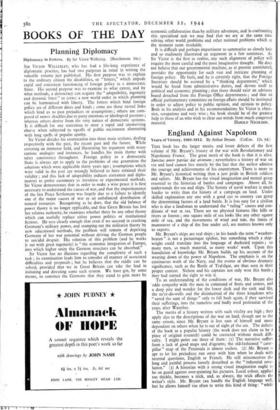BOOKS OF THE DAY
Planning Diplomacy
Diplomacy in Fetters. By Sir Victor Welles:ey. (Hutchinson. 16s.)
SIR VICTOR WELLESLEY, who has had a life-long experience of diplomatic practice, has had two purposes in mind in writing the valuable volume just published. His first purpose was to explain to the ordinary citizen the disabilities, or " fetters," which impede rapid and consistent functioning of foreign policy in a democratic State. His second purpose was to examine to what extent, and by what methods, a democracy can acquire the " adaptability, ingenuity and dynamic force " to create a new world order in which planning can be harmonised with liberty. The fetters which bind foreign policy are of different dates and kinds ; some are those rusted links which bind us to past prejudices or assumptions ; others are com- posed of newer shackles due to party emotions or ideological passions ; whereas others derive from the very nature of democratic systems. It is difficult for any statesman to steer a rapid and unswerving aiurse when subjected to squalls of public excitement alternating with long spells of popular apathy. Sir Victor divides his examination into three main sectians, dealing respectively with the past, the recent past and the future. While covering an immense field, and illustrating his argument with many curious analogies and instances, he handles his main theme with strict consistency throughout. Foreign policy in a democratic State is always apt to apply to the problems of one generation the solutions which were applicable thirty years ago ; assumptions which were valid in the past are wrongly believed to have retained their validity ; and this lack of adaptability induces statesmen and diplo- matists to prefer customary to inventive or experimental methods. Sir Victor demonstrates that in order to make a wise peace it is first necessary to understand the causes of war, and that the impermanence of the last Peace Settlement was largely due to a failure to identify one of the major causes of war as an unbalanced distribution of natural resources. Recognising as he does, that the old balance of power theory is no longer applicable, and that Great Britain has lost her relative authority, he examines whether there be any other theory which ,can usefully replace either power politics or institutional fictions. He sees clearly enough that even if we succeed in crushing Germany's military power, and stamping out the militarist theory by new educational methods, the problem will remain of depriving Germany of her war potential without driving the German people to suicidal despair. His solution of this problem (and he works it out with great ingenuity) is " the economic integration of Europe, into which higher unity the German structure can be absorbed."
Sir Victor has no illusions regarding the complexity of such a task ; its examination leads him to consider all manner of associated difficulties and proposals ; but he believes that the riddle can be solved, provided that we in Great Britain can take the lead in initiating and directing some such system. We have got, by some means, to convince the Germans that they stand to gain more by economic collaboration than by military adventure, and in confronting this specialised task we may find that we are at the same time solving other world problems and other national problems which at the moment seem insoluble.
It is difficult and perhaps impertinent to summarise so closely knit and so studiously illustrated an argument in a few sentences. As Sir Victor is the first to realise, any such alignment of policy will require the most careful and the most imaginative thought. He does not believe that our governmental machine, as at present constituted, provides the opportunity for such vast and intricate planning of foreign policy. He feels, and he is certainly right, that the Foreign Secretary should be assisted by a " thinking department," which would be freed from administrative duties, and devote itself to political and economic planning ; that there should exist an advisory board detached from the Foreign Office departments ; and that an official parliamentary committee on foreign affairs should be instituted in order to adjust policy to public opinion, and opinion to policy. Both in his analysis and in his recommendations Sir Victor is objec- tive, scrupulous and very wise ; his book should be of• the greatest help to those of us who wish to clear our minds from much congested


























 Previous page
Previous page